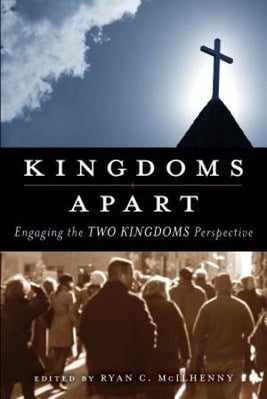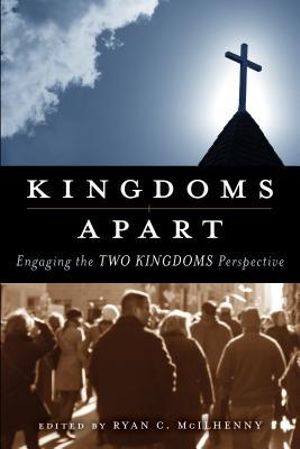
I am really pleased to welcome (again) Matthew Tuininga to Mere-O. A Ph.D. candidate at Emory University, Matthew is one of the sharpest young Christian voices working at the intersection of religion and politics. The first part of this review can be found here. I commend his blog to you highly. – MLA
The first and last chapters of the book, however, by Ryan McIlhenny, articulate a much better model of Christian cultural engagement, a model in substantive continuity with a basic two kingdoms paradigm if perhaps not with that of “the Two Kingdoms perspective” engaged in this book. While I do not agree with McIlhenny on every point, I do find his overall perspective to be a helpful step forward.
In the opening chapter McIlhenny, who is quite sympathetic with criticisms of certain versions of neo-Calvinism, explains why he nevertheless believes it should not be abandoned. But what is the neo-Calvinism that he is defending? The core assertion, he notes, is that Christ’s sovereignty extends to every square inch of the cosmos. He then develops this assertion in terms of four basic tenets: the cultural mandate, sphere sovereignty, the antithesis, and common grace. What is striking about this core assertion and its four tenets is that they are equally affirmed, if with some qualifications, by the leading Two Kingdoms advocate David VanDrunen. Is it possible that VanDrunen’s own project presupposes a basic neo-Calvinist theological framework?
The main difference to McIlhenny, it seems, is that while VanDrunen emphasizes the commonness of cultural activities by virtue of the Noahic Covenant, neo-Calvinists affirm that creation always had a Christological telos and that those who are redeemed in Christ are to witness to that telos in everything that they do. “Thus, for the neo-Calvinist, understanding the continued relevance of the cultural mandate, a changed life through the gracious work of Christ, opens one’s eyes to attend to the wounds of a broken world, spreading the gospel and demonstrating the love of Christ to the whole earth. Christians necessarily act on their transformed lives. Whatever Christians do, even the most quotidian of things such as eating and drinking, they must do for the honor and glory of God” (xxi).
But does VanDrunen really disagree with this point? I cannot speak for him but I am certainly not aware of anything in a two kingdoms paradigm that would lead one to say anything differently. The real question, then, is what does McIlhenny think this acting on the basis of transformed lives look like? And for that we need to turn to the last chapter of the book.

In the last chapter of the book McIlhenny articulates his model of cultural engagement: Christian Witness As Redeemed Culture. Although the chapter is a revision of an essay in which McIlhenny tried to articulate a middle way between neo-Calvinism and the Two Kingdoms perspective, even here McIlhenny is clearly seeking a position that embraces the best insights of both perspectives. Indeed, invoking H. Richard Niebuhr’s five models of Christ and culture he reminds his readers that the models “are not isolated categories to choose from. Each one overlaps, and they are better understood as corresponding moods that every Christian feels when engaging culture” (252). Stating his desire to “bridge the aisle by highlighting a feature of Christian cultural activity that both Two Kingdoms and neo-Calvinist thinkers can agree on” he stresses the character of Christian cultural engagement as a matter of witness and service in expression of Christ’s kingdom, a “setting apart” of Christian activity as “redeemed culture” in place of the transformational activism that seeks to be “externally sacralizing” by “redeeming culture, as if it were a thing to which redemption needs to come” (253). In short, McIlhenny favors transformed witness over transforming conquest.
Key to McIlhenny’s argument is his careful and scholarly definition of culture. He distinguishes between a view of culture as a thing or object that is given to us without meaning, a view he suggests VanDrunen implicitly espouses in his Living in God’s Two Kingdoms, and culture as a language of meaning, or to take the phrase of Clifford Geertz, which McIlhenny appropriates, a “transmitted pattern of meetings” (260). “Failing to recognize culture as language puts us in the habit of confusing culture with nature. It is crucial to understand this point. Presupposing culture as a thing, I believe, is a problem common to both neo-Calvinists and Two Kingdom proponents. Culture is born from human interaction with nature, as stated above, but is distinct from it” (261).
In other words, McIlhenny is suggesting that when VanDrunen emphasizes commonality between what believers and unbelievers do he is talking about nature itself, the objective stuff of life. And McIlhenny does not disagree that when it comes to this the activity of Christians is often no different from that of unbelievers. But he suggests that to properly understand what is going on in cultural engagement we need to recognize that human beings constantly and inevitably use the stuff of nature in ways that communicate meaning. In the context of the antithesis that both he and VanDrunen affirm, therefore, the ways in which Christians understand and communicate the meaning of what they do has to be fundamentally different from the way in which unbelievers do.
To be sure, the project of Christians should not be to seek to transform the culture of unbelievers – an impossible task.
Login to read more
Sign in or create a free account to access Subscriber-only content.
Topics:
